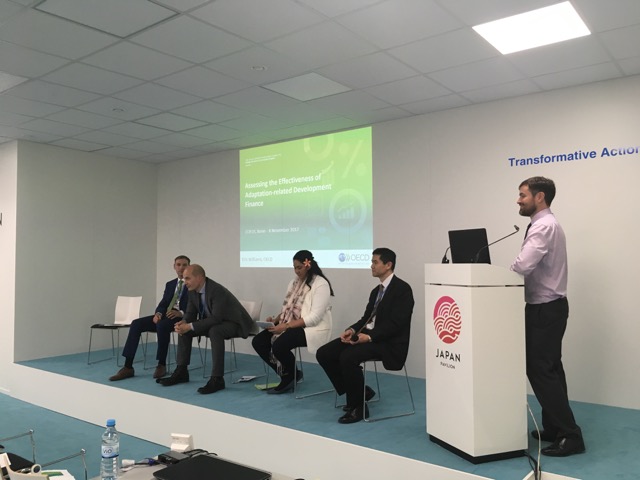
13:00 - 14:30
| Event title | Aid for adaptation: Assessing effectiveness |
|---|---|
| Contents | The question of adaptation-related aid effectiveness is critical to ensuring that limited resources are allocated and used in a way that delivers results. Recent studies have differing conclusions on whether or not aid is being prioritized for the most vulnerable countries. Very few analyses have taken the further step to evaluate the effectiveness of adaptation-related ODA in helping developing countries reduce vulnerability and improve resilience to climate change. Invited panelists will briefly present on related topics (e.g. private finance for adaptation and challenges in implementing adaptation projects). The panelists will then engage in a facilitated discussion, with audience participation, to elicit feedback on promising approaches for measuring the effectiveness of climate finance for adaptation. |
| Keywords | Adaptation; resilience; aid effectiveness |
| Speakers Name and Title |
|
| Moderator |
|
| Organiser / Co-organiser |
|
Keynote presentation (10 min):
Assessing the Effectiveness of Adaptation-related Development Finance, Eric Williams, Policy Analyst, OECD Development Co-operation Directorate
Moderated panel discussion (40 minutes)
Open discussion with the audience (35 minutes)
Wrap-up and closing of the side event by the panelists and moderator (5 minutes)
The difficulty of designing and assessing the effectiveness of climate change adaptation-related development co-operation is exacerbated due to the uncertainty of global temperature trajectories and non-linear climate change impacts. Sound planning processes, including projections of local climate change impacts, play a crucial role in designing effective adaptation-related development co-operation interventions, but capacities are often insufficient at the local and national level. Further, tools in increasing the effectiveness of adaptation interventions are National Adaptation Programmes of Action, M+E systems, impacts- and results-based management, mid-term evaluations as well as early warning systems.
In evaluating the effectiveness of adaptation-related development co-operation projects, evaluators assume three functions:
Tracking climate change adaptation-related finance is a prerequisite in assessing progress made on climate change adaptation at the local and national levels. The definition of what constitutes ‘adaptation projects’ is crucial, and the OECD’s guideline on the Rio Marker on adaptation is crucial in ensuring coherence across donors’ reporting to the OECD DAC CRS. Harmonising data provided to the OECD DAC CRS and the Convention as well as that provided by developing countries is important. Further, elements of the Paris Agreement, i.e. the global stock take and transparency framework, have increased the importance of monitoring and evaluating adaptation-related development projects.
While there are synergies across measuring progress made on adaptation at the global level, SDGs and Sendai, the different platforms have specific foci such that individual monitoring frameworks should not replace others.
Eric Williams, Policy Analyst, OECD Development Co-operation Directorate


Copyright Ministry of the Environment Government of Japan. All rights reserved